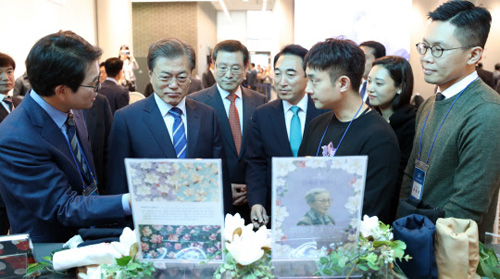[5 years job creation roadmap] Job denotation to be expanded by public & social economy
[ Park Mee Yeong mypark@ ] | 2017-10-19 11:25:28
President Moon Jae-in is having a standing meeting with businessmen who have been in business before the start of the meeting at Seongsu-dong, Heyground, Seoul, where the 3rd meeting of the Jobs Committee was held on the afternoon of the 18th. At this spot, we are seeing small items such as phone cases made by the motif of the lives of victims of the Japanese military comfort women of Marymond. Photo by Yunhap News
Moon Jae-in has decided to revitalize innovation-based technology, expand taxpayers` subsidies, and abolish solidarity guarantees. In order to revitalize the social economy in order to create jobs for the private sector, the Ministry of Strategy and Finance is expected to set up the Control Tower and the Social Economic Development Committee, and plans to formulate the `Social Economy 3 Act` by the end of this year. In the case of the public sector, indirect employment is converted into direct employment and shortened working hours to expand 300,000 jobs, creating a total of 810,000 jobs.
The Presidential Direct Jobs Committee held its third meeting on October 18 at the Hyeong Sung, Seongsu-dong, Seongdong-gu, Seoul, and revealed the `Five-year Roadmap of Job Policies`.
The so called five-year roadmap for the new government`s job policy consists of five areas: building job infrastructures, creating public jobs, creating private jobs, improving job quality, and providing customized jobs. Below are the 10 major projects and 100 detailed projects. If the draft of the Jobs Committee concentrates on improving the public sector and job quality, such as the expansion of the public sector employment of 810,000, the final proposal will be for the promotion of innovative businesses in the private sector and for the advancement of future new industries such as information and communication technology (ICT) Commercialization and so on. In addition to the measures to revitalize social enterprises, the outreach of the employment policy has greatly expanded.
As a result, the new government`s job policy is largely divided into three sectors: public sector jobs, creation of private jobs through revitalization of entrepreneurship, and revitalization of the social economy.
In the public sector, 820,000 public jobs are expected to be expanded, and the private sector will promote innovation-based entrepreneurship, enhance industrial competitiveness, and nurture a new industry service industry.
To encourage innovation-based entrepreneurship, the government plans to expand the deduction of entrepreneurship and venture companies, to abolish the policy and financial guarantee until 2018, to transfer the venture verification system to the private sector, and to deregulate the venture investment.
The government is expected to expand the support of small and medium-sized enterprises (R & D) by preventing the expansion of large enterprises and unfair trade in order to strengthen the capabilities of small and medium-sized enterprises with a high proportion of job creation. It has also redesigned the SME policies by gradually phasing out promissory notes and expanding financial support.
Meanwhile, in the final job roadmap, a new social economic stimulus was added. The social economy of a cooperative, a village enterprise, and a social venture is more effective in inducing employment than a general corporation.
The government builds a social economic control tower by constructing a consultative body for related ministries, centering on the Ministry of Strategy and Finance, in order to build a social economic ecosystem. In order to establish a legal basis, the government decided to enact the 3 laws of social economy, such as the basic law on the realization of social values of public institutions, the basic law of social economy, the special law on the promotion of purchase of social economic enterprise products and the support of market.
The government, on the other hand, plans to respond to the urgent job crisis through the roadmap, and to preemptively prepare for the future employment crisis caused by the deepening of aging and the fourth industrial revolution. President Moon Jae-in, who presided over the meeting, said, "Innovation entrepreneurship and social economy will greatly expand the economic realm and contribute to the creation of youth jobs." Especially, the social economy is an alternative to overcome unemployment and economic inequality, a good economy that solves social problems while increasing employment."
By Park Mee Yeong mypark@



